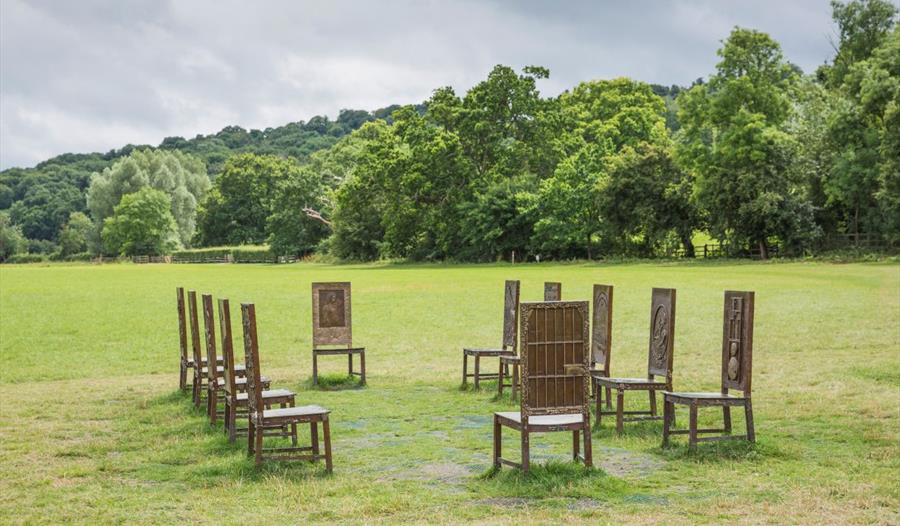
|
20A010 Why Have Juries? by Jim Davies, 3/10/2020
They are notoriously unpredictable and may seem a waste of time. Why bother? Juries are an English invention, and because not long ago two fifths of the world was pink, remnants are found in all countries of the former British Empire. Bit by bit, though, after independence those countries limited the right to a jury trial to cases where the sentences were severe (more than a year, five years, etc.) That has even been done in the old country itself. Here in the US, despite the very clear wording of Amendment Six, if you're up for a traffic "offense" you'll search in vain for a jury. Governments hate juries. The hatred was there from the get-go, at a field in Runnymede, a muddy island in the River Thames. "The government" in 1215 was an absolute monarch, John - but in that year he was in dire straits. For a decade, he had waged an expensive war to regain territory in Northern France, and had lost. So his barons, who had actually produced the funds and manpower for the fight, were unhappy campers. They had been running a revolt and had actually captured London, and they met His Majesty in that field for a peace conference.
The alternative, widely practiced worldwide, is that cases be judged by a judge, or by a tribunal - three judges, so that no one person can dispose of the life or liberty of another. Judges, however, are government employees. They may be well trained in the law, and with experience may be able to detect guilt accurately at 100 feet; but ultimately, they are pipers paid by the party that makes the laws. Impartiality is impossible, if they want to retain their job. They will rule in their employer's favor, unless innocence is especially obvious. As I write, the fate of Julian Assange, who exposed some of the FedGov's misdoings, is being decided by one judge, just a few miles down river from Runnymede; Vanessa Baraitser. Should she decide properly that he does not deserve extradition to the US, her future would be blighted. Peace conferences are usually compromises - and when not, as at Versailles in 1919, the result is a diktat with dreadful consequences - and Runnymede was no exception. The barons would have done much better to take more power away from the King; but he'd have refused, and the civil war would have continued, and they had already been wasting far too much on war. Juries are by no means guarantors of justice; routinely, they are pre-selected by government prosecutors with virtually unlimited funds so as to be biased in favor of guilt. They are told for example that they may judge only the "facts" of the case, not the "law", for that's the exclusive job of the judge; this falsehood is a total reversal of the Runnymede agreement but if the juror doesn't swear to accept it, he goes home and the accused is at the mercy of collaborators. So if ever you get called to "jury duty", be prepared to swear a lie in the interests of justice. Will there be juries in the coming zero government society? - only if there is a market demand. Some (competing) courts may decline to provide them, others will always have them. I think most will make juries available at the option of the defendant. Since there will be no laws, there will be no occasion for jurors to overturn any; court cases will always have the form Victim vs. Accused Perp; and government will not be involved, there being none. Juries are a most valuable limit on government power; but when there is no government power, their importance will fade away. |
|
||||||||||||||||||||||||||||||||||||||||||

 The outcome was a clipping of his power. The bit relevant here is that while the King could continue to issue edicts (laws) at will, from 1215 onwards any of the barons who were accused would have the case judged by other barons, also known as "Peers." This gutted John of his absolute power. If the barons didn't agree with one of his edicts, or if their jury didn't think the accused broke it, they would acquit. That's the origin of the jury system; it's all about limiting government power. No wonder rulers hate it.
The outcome was a clipping of his power. The bit relevant here is that while the King could continue to issue edicts (laws) at will, from 1215 onwards any of the barons who were accused would have the case judged by other barons, also known as "Peers." This gutted John of his absolute power. If the barons didn't agree with one of his edicts, or if their jury didn't think the accused broke it, they would acquit. That's the origin of the jury system; it's all about limiting government power. No wonder rulers hate it.








